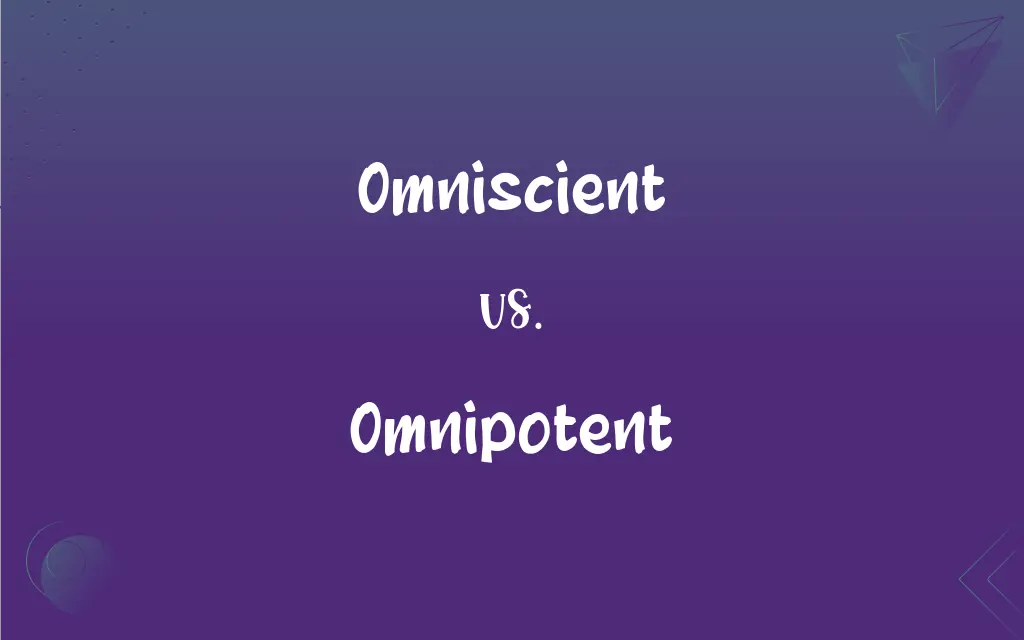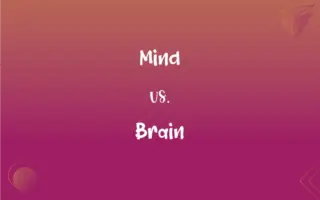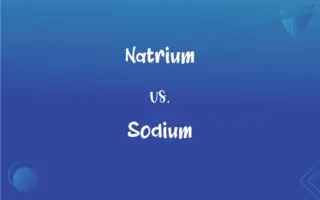Omniscient vs. Omnipotent: What's the Difference?
Edited by Harlon Moss || By Janet White || Published on December 20, 2023
Omniscient means having complete or unlimited knowledge, while omnipotent refers to having unlimited power or authority.

Key Differences
Omniscient implies all-knowingness, encompassing complete understanding and knowledge. Omnipotent signifies limitless power, capable of doing anything.
In literature, an omniscient narrator knows every character's thoughts and feelings. An omnipotent character, however, can alter any aspect of the story at will.
Omniscient entities in religious contexts understand all past, present, and future events. Omnipotent beings, conversely, possess the power to create, change, or destroy.
The concept of omniscience involves deep wisdom and insight. Omnipotence, by contrast, involves absolute authority and might.
Omniscience relates to knowledge and information. Omnipotence, however, is linked to the capability and execution of actions.
ADVERTISEMENT
Comparison Chart
Definition
Having complete knowledge
Having unlimited power
In Literature
Knows all character perspectives
Can change plot or events
In Religion
Understands all of existence
Capable of any miracle or action
Associated With
Wisdom and insight
Authority and might
Role in Decision-Making
Informed by all perspectives
Capable of executing any decision
ADVERTISEMENT
Omniscient and Omnipotent Definitions
Omniscient
Omniscient is often used in literature to describe a type of third-person narrator.
The omniscient point of view allowed readers to understand each character's inner thoughts.
Omnipotent
In a figurative sense, omnipotent refers to having a significant influence or control.
The CEO's decision was omnipotent within the company.
Omniscient
Omniscient means having complete understanding of all things.
The omniscient narrator revealed secrets unknown to the characters.
Omnipotent
Omnipotent can also imply the ability to do anything, even the seemingly impossible.
The superhero's omnipotent powers saved the city from disaster.
Omniscient
Omniscient implies infinite awareness, understanding, and insight.
The omniscient guide in the story knew the fate of every character.
Omnipotent
In religious contexts, omnipotent often refers to a deity's absolute power over the universe.
The faithful prayed to an omnipotent deity for help in times of crisis.
Omniscient
In religion, omniscient refers to a deity's ability to know everything.
Believers often attribute omniscient qualities to their gods.
Omnipotent
Omnipotent can describe a person or entity with boundless authority.
The dictator ruled the land as though he were omnipotent.
Omniscient
In a broader sense, omniscient can describe anyone or anything that appears to know everything.
The teacher seemed omniscient, answering every question accurately.
Omnipotent
Omnipotent means possessing complete, unlimited, or supreme power.
In many myths, gods are described as omnipotent beings.
Omniscient
Having total knowledge; knowing everything
An omniscient deity.
The omniscient narrator.
Omnipotent
Having unlimited or universal power, authority, or force; all-powerful.
Omniscient
One having total knowledge.
Omnipotent
One having unlimited power or authority
The bureaucratic omnipotents.
Omniscient
Omniscient God. Used with the.
Omnipotent
Omnipotent God. Used with the.
Omniscient
Having total knowledge.
The story was narrated from an omniscient point of view.
The Abrahamic God is omniscient.
Omnipotent
Having unlimited power, force or authority.
Omniscient
One who has total knowledge.
Omnipotent
(biology) Describing a cell (especially a stem cell) that is capable of developing into any type of cell or forming any type of tissue (also called a totipotent cell).
Omniscient
Having universal knowledge; knowing all things; infinitely knowing or wise; as, the omniscient God.
For what can scape the eyeOf God all-seeing, or deceive his heartOmniscient?
Omnipotent
An omnipotent being.
Omniscient
Infinitely wise
Omnipotent
Able in every respect and for every work; unlimited in ability; all-powerful; almighty; as, the Being that can create worlds must be omnipotent.
God's will and pleasure and his omnipotent power.
Omnipotent
Having unlimited power of a particular kind; as, omnipotent love.
Omnipotent
Having unlimited power
FAQs
Can omnipotent beings create paradoxes?
The concept of omnipotent beings creating paradoxes is a topic of philosophical debate.
Can omnipotent beings be limited by anything?
By definition, omnipotent beings are not limited by anything.
What does omniscient literally mean?
Omniscient literally means knowing everything.
Does omniscient always relate to divine entities?
While often associated with divinity, omniscient can describe any entity perceived as all-knowing.
Can an omniscient being also be omnipotent?
In some beliefs and stories, a being can be both omniscient and omnipotent.
How is omniscience depicted in storytelling?
In storytelling, omniscience often appears as a narrative voice that knows all characters' thoughts and actions.
Is omniscience possible for humans?
In reality, omniscience is beyond human capability; it's more a philosophical or fictional concept.
Does omnipotence imply the power to alter reality?
Yes, omnipotence includes the power to change, create, or destroy aspects of reality.
Are omnipotent characters common in literature?
Omnipotent characters are less common in literature, as they can make storytelling unchallenging.
Is omnipotence a common attribute in myths?
Many myths and religions attribute omnipotence to their gods or supreme beings.
Can omnipotent beings defy the laws of nature?
In theory, omnipotent beings can defy and even change the laws of nature.
Is it possible to be omnipotent but not omniscient?
Yes, it's conceivable to have unlimited power (omnipotent) without knowing everything (omniscient).
Can omniscient narrators have biases?
Although omniscient, narrators can still present stories with certain biases or perspectives.
Are there any limitations to omnipotence?
Theoretically, omnipotence has no limitations, but it's a subject of extensive philosophical debate.
Is the concept of omniscience limited to knowledge?
Yes, omniscience is solely about the extent of knowledge, not power or action.
How does omnipotence affect a being's responsibility?
With omnipotence often comes the philosophical question of ultimate responsibility for actions or events.
Can humans achieve omniscience through technology?
While technology can vastly increase knowledge, true omniscience remains unattainable for humans.
Can omnipotent powers be transferred or shared?
In fictional narratives, omnipotent powers can sometimes be transferred or shared, but this varies by story or belief system.
Do omniscient beings make decisions?
An omniscient being would have all necessary information to make decisions, but decision-making itself is a separate aspect.
Does omniscience include understanding emotions and thoughts?
Yes, omniscience encompasses knowing all emotions, thoughts, and experiences.
About Author
Written by
Janet WhiteJanet White has been an esteemed writer and blogger for Difference Wiki. Holding a Master's degree in Science and Medical Journalism from the prestigious Boston University, she has consistently demonstrated her expertise and passion for her field. When she's not immersed in her work, Janet relishes her time exercising, delving into a good book, and cherishing moments with friends and family.
Edited by
Harlon MossHarlon is a seasoned quality moderator and accomplished content writer for Difference Wiki. An alumnus of the prestigious University of California, he earned his degree in Computer Science. Leveraging his academic background, Harlon brings a meticulous and informed perspective to his work, ensuring content accuracy and excellence.






































































